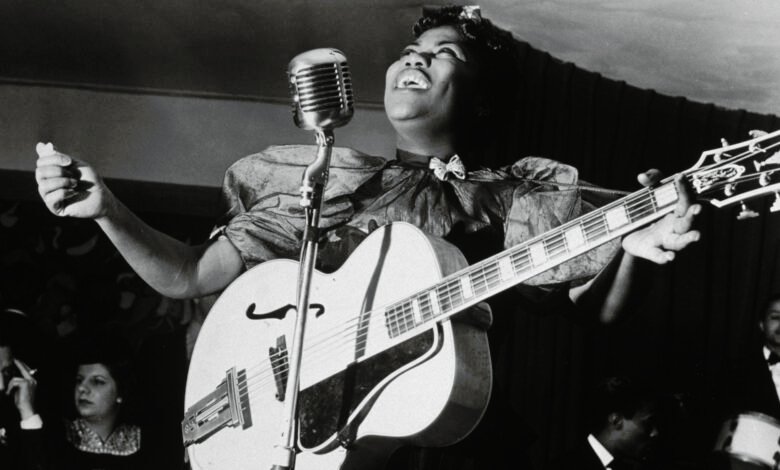“Let’s do that again!” This compilation of fiery Sister Rosetta Tharpe guitar solos shows how her revolutionary playing inspired blues-rock greats like Eric Clapton, Jimi Hendrix, Jeff Beck and the Rolling Stones

Recognition of Sister Rosetta Tharpe, and her seismic impact on the development of rock electric guitar playing, has increased in recent years. Mind you, that bar of recognition was incredibly low to begin with.
Tharpe – a native of Arkansas – was a genuine star in the ’50s and ’60s, and was prominent enough in the early part of the latter decade to come to the attention of, and hugely influence, the playing of virtually the entire crop of what would become the A-tier of British blues-rock guitarists.
While those players – Eric Clapton, Jeff Beck, Keith Richards and Brian Jones among them – went on to play packed concert halls, arenas, and even stadiums by the 1970s, Tharpe faded into obscurity after her death in 1973, to the point where her grave remained unmarked for decades.
Thanks in part to the internet, though, Tharpe’s name has begun to take its rightful place in lists of blues guitar pioneers. Case in point is this incredible, much-viewed YouTube compilation of incendiary Tharpe guitar solos.
There’s a lot to gather from the video, but what stands out fairly quickly as a through line is the aggressiveness of Tharpe’s playing. A decade before the likes of Clapton and Hendrix sent their tube amps into the red, Tharpe was doing the same. Wild slides, shaking the neck for dramatic vibrato effect, shouting “Let’s do that again!” after a particularly sizzling passage… all at a time when even plugging a guitar into an amp was still seen as controversial in certain circles.
The sheer speed of her fretwork is also attention-grabbing. There’s a touch of jazz in the fluidity of her lead lines and laser-like right-hand precision, but no jazz guitarists – certainly of that age – were offending more conservative-minded listeners with proto-distorted missives (reviewing one of her first UK gigs in 1957, critic Bob Dawbarn complained that Tharpe’s “long-admired guitar playing [was] transformed through a jangle-box into a shambles of slurring sound.”)
Tharpe’s legacy doesn’t just loom large in the blues, though. Particularly as she rose to fame in the late ’30s, her playing was rooted in what would become known as “country-blues,” and she indeed proved to be a formative influence on the former genre as well, something you can hear in some of her more twanging leads and pulsing rhythm work.
Proof lies in the 1992 Rock and Roll Hall of Fame acceptance speech of none other than Johnny Cash, in which he cited the influence of Tharpe’s recordings alongside those of white country luminaries like Hank Williams and the Carter Family.
As Tharpe herself put it in a 1957 interview with the Daily Mirror, “All this new stuff they call rock ’n’ roll, why, I’ve been playing that for years now.“
One looking for evidence need only watch her solos.
Thank you for reading 5 articles this month**
Join now for unlimited access
US pricing $3.99 per month or $39.00 per year
UK pricing £2.99 per month or £29.00 per year
Europe pricing €3.49 per month or €34.00 per year
*Read 5 free articles per month without a subscription





